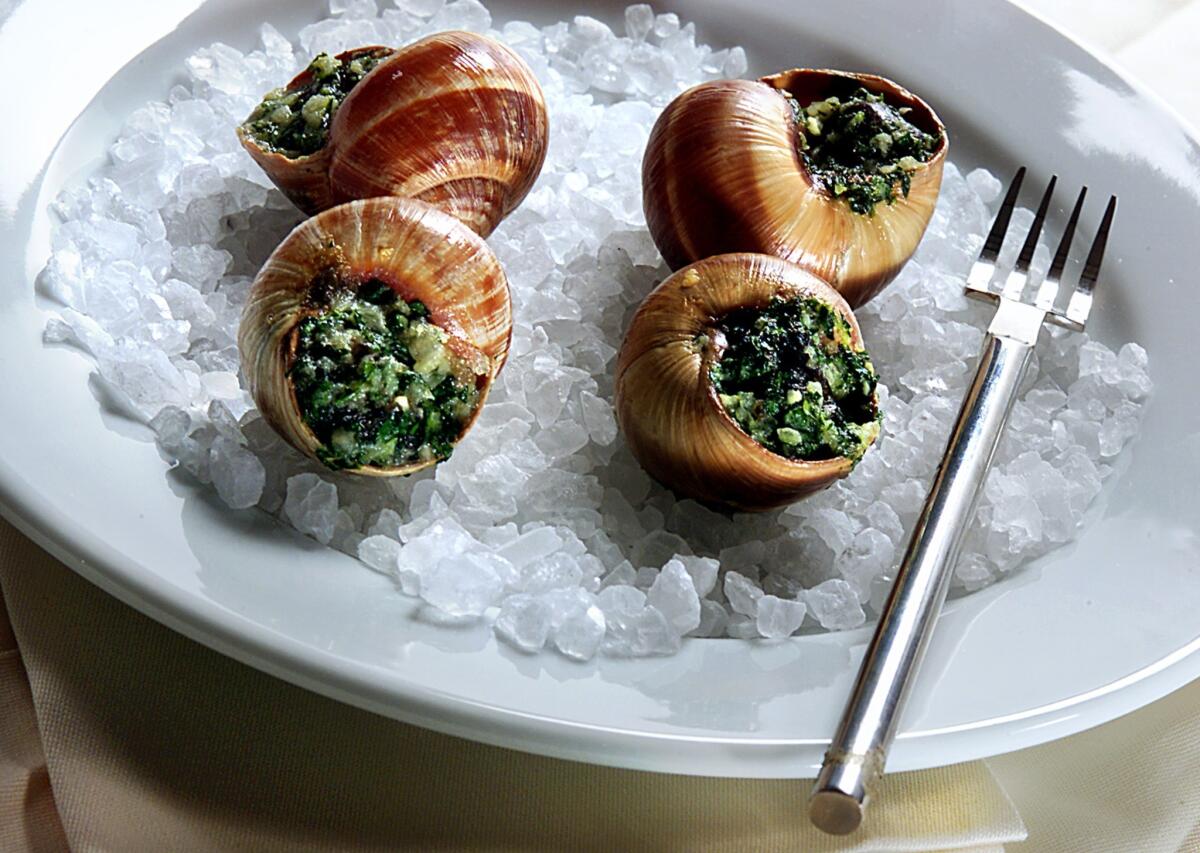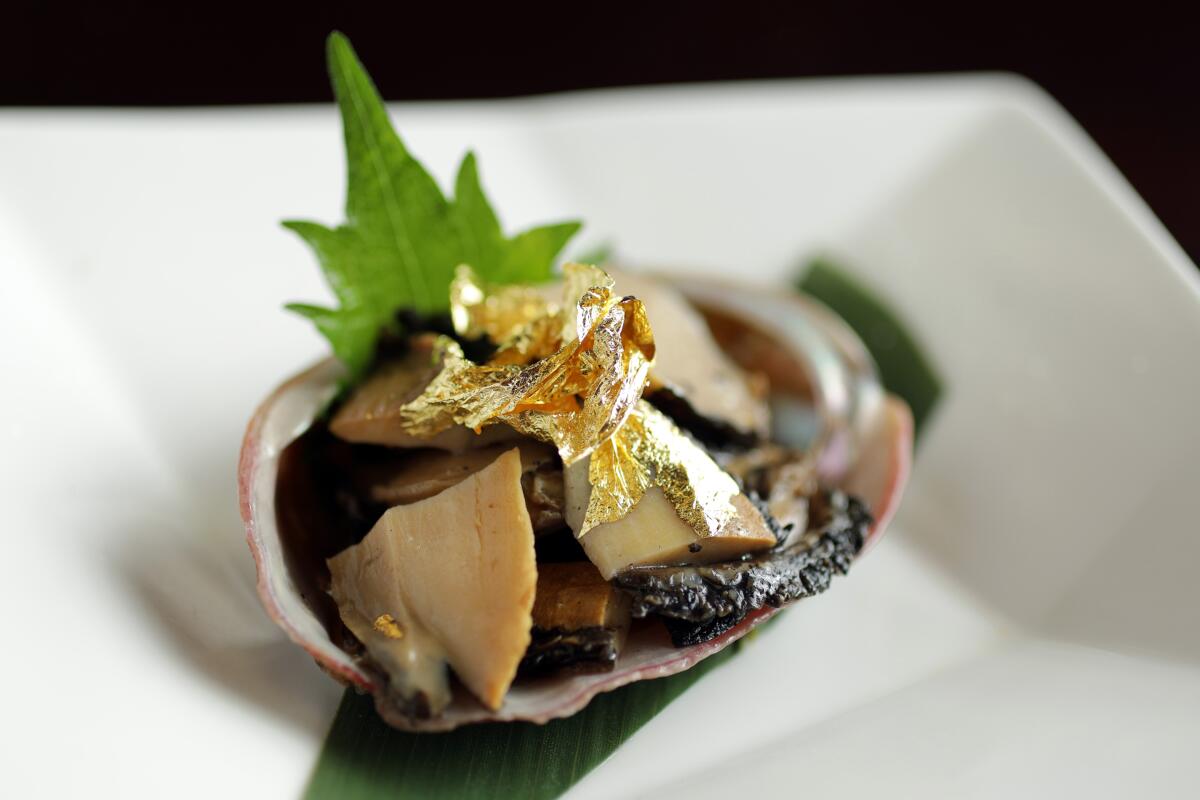Newsletter: It’s your last day on Earth. What are you having for dinner?

- Share via
Recently I was interviewed by Jay Rayner, the longtime restaurant critic at the Observer in London, about the differences between American and U.K. restaurant criticism. (In a nutshell: He thinks we American critics are an overly serious, soft-bellied lot.)
Eat your way across L.A.
Get our weekly Tasting Notes newsletter for reviews, news and more.
You may occasionally receive promotional content from the Los Angeles Times.
Rayner has enjoyed a long career as a reporter and broadcaster, but he’s probably best known for his scathing restaurant reviews (his 2017 takedown of Paris’ three-Michelin-starred Le Cinq made international headlines).
He is on the road promoting his latest book, “Jay Rayner’s Last Supper: One Meal, a Lifetime in the Making.” It’s a witty memoir of food, music and journalism framed around a seemingly simple question: If you knew today was your last day on Earth, what would be your final meal? To answer the question, Rayner decides to stage the perfect last supper.
I recently talked to Rayner about his book and what he describes as “dinner as an act of resistance against death.”
The U.S. edition of Rayner’s book launches March 3.
In the book, you stage your own last supper while you’re still healthy enough to enjoy it. I don’t want to give away your final menu, but I was surprised by how simple many of the dishes were, especially the pork course. Why no foie gras or expensive steak?
I love a fancy meal as much as the next overly entitled, over-privileged restaurant critic. But there is something about those luxury items which can deaden the whole experience. They become the center of attention, and it’s very hard to build your own personal memories around them when the ingredients are shouting “LOOK AT ME.” The book is really about the role food plays in our memories and our emotions. As part of its publication I’ve asked people for theirs. The best was from a man who said he would knock on the door of the house where his late grandma lived and ask if he could sit on the back step and eat a Dairylea triangle (a very British kind of cheap processed cheese). It was a man recalling a memory of being loved and feeling secure. Few people feel that way about a chateaubriand.
You dedicate a chapter to sourdough and mount a passionate defense of bread. What’s your take on the keto diet, which is very hot right now in the U.S.?
Given what I do for a living, and my sluggish metabolism, I constantly have to watch my weight, which means I sometimes avoid carbs. But things like the keto diet are both risky and unsustainable. It is not a route to sustained and maintained weight loss, and it can do you a lot of harm. All too often it’s peddled by people with, at best, dodgy medical knowledge. Plus, it makes your breath stink. It’s not a good idea. Also, bread is fabulous.
Enjoying this newsletter? Consider subscribing to the Los Angeles Times
Your support helps us deliver the news that matters most. Become a subscriber.
You go looking for escargot in Paris but end up finding a better version of the dish in London. As someone who travels to eat, do you find that bigger cities are becoming more and more alike?
Yes, and no. The big cities of Europe do maintain their traditions: You can still eat brilliant suckling pig in Madrid for example, or superb tripe sandwiches in Florence. The challenge, as with Paris and the snails, is finding them. That said, I’m not going to criticize these places for also now having great Chinese, Thai or Indian restaurants, or fabulous sushi. Why shouldn’t someone in Madrid or Rome hanker after a great Thai green curry in the way I do in London? I’ll be honest. At times I’ve found myself in one of these places famed for their local culinary traditions, Toulouse say, and after three days of cassoulet there’s nothing I wouldn’t do for a cracking omakase.
In 2009, you spent what sounds like a miserable evening interviewing Mario Batali, who was then at the height of his popularity. He made several lewd references toward women in your presence. You were certain that quoting him would be enough to reveal him as a “ludicrous, unself-aware schmuck.” But he thrived for many years after that. Why do you think it took so long for the #MeToo movement to reveal the long history of sexual harassment by star chefs like Batali?
I hoped that quoting Batali would hang him with his own words, though I hate the fact that I hadn’t clocked what a monster he was. The fact is that the restaurant business is a terribly hierarchical profession. They don’t call the staff in kitchens a brigade for nothing. And that top-down power makes it very, very hard for people to speak out about those in charge. I have massive respect for the courage of the women who did finally tell us what type of people Batali and [chef John] Besh are and wish they had been empowered to do so before. But we’re not done. My newspaper has tried to investigate certain figures here in Britain but getting their victims to go on the record can be very hard.
2019 marked your 20th year as a professional restaurant critic. In the U.S., many food journalists fret that the role is disappearing. Do you think this job will still exist in 20 more years?
Honestly, yes I do, for one reason and one reason only: Despite the doomsaying from some quarters and the evidence of some papers dispensing with critics, if managed in the right way they can be a driver of traffic and eyeballs and that means revenue. I always use a version of former New York Times critic Ruth Reichl’s line: that my job is to sell newspapers or the digital equivalent thereof. That means I’m serving the readers not the restaurants. (It infuriates the latter, but that’s the truth). The job is to stay relevant to the readers, to make them feel they need to read you. Which means paying attention to the writing. Do that, and there’s still a job.
There’s a poignant memory of a salt-beef sandwich you offered your father when he was ill. He was not well enough to eat it. You write: “Illness murders appetite. Medication blunts and steals taste buds.” This meditation on mortality animates much of the book. Did throwing yourself a last supper help you make peace with death?
Absolutely not. If anything, it was an act of resistance against death. I love being here, and I intend to be absolutely livid when the end comes. And that was the point. Not to give anything away, but the last supper I held was actually a celebration of life and I want to keep living it for as long as possible.
Ask the Critics
Do you go to great lengths to preserve your anonymity?
— Mariah L., email
Many people are curious about what it’s like to review restaurants anonymously. I wish I could tell you exciting stories involving mystery, intrigue and a closet full of appearance-altering disguises. The truth is less thrilling: I make reservations under a different name; I try to interview chefs over the phone; and I generally avoid hanging out at industry events filled with chefs and restaurant owners. I find it pretty easy to fly under the radar by sticking to these measures.
Have a question for the critics?
Our stories
— In this special crossover episode of The Bucket List, Jenn Harris enlists the help of Lucas Kwan Peterson, the Power Rankings king, to help rank five fast-food chicken spots.
— Bill Addison revels in the unconventional sushi omakase at Go’s Mart, where gold-leaf garnishes and truffle oil are part of the fun. (Psst: Did you read about the delicate fish dumplings Bill recently came across at New Qingdao in Alhambra?)
— Supermarkets: bad lighting, yet also kind of wonderful. Here are 11 beloved supermarkets. (And check out what some of the best chef’s in L.A. are buying.)
— Garrett Snyder reports on a new Grand Central Market restaurant from the team behind Baroo, and also the Japanese American chain Curry House, which abruptly closed all its locations this week.
— Genevieve Ko adapts a classic California recipe: the tortilla soup made by chef Sally Schmitt, one of the original co-founders of the French Laundry. And Daniel Miller wrote a lovely story on Schmitt and the origins of the lauded Yountville restaurant.
— Need some group-friendly dinner inspiration? Ben Mims has an excellent Cajun seafood stew inspired by his childhood visits to New Orleans.
— Also: L.A. Times Food Bowl is back for its fourth year! The festival takes place the entire month of May. Tickets for all events go live in early April; tickets are on sale now for the Launch Party: Collaboration Lab (last year included mashups like Shibumi x Spago) on Thursday, April 30, and for Food Bowl’s Night Market VIP tasting sessions.

Eat your way across L.A.
Get our weekly Tasting Notes newsletter for reviews, news and more.
You may occasionally receive promotional content from the Los Angeles Times.



